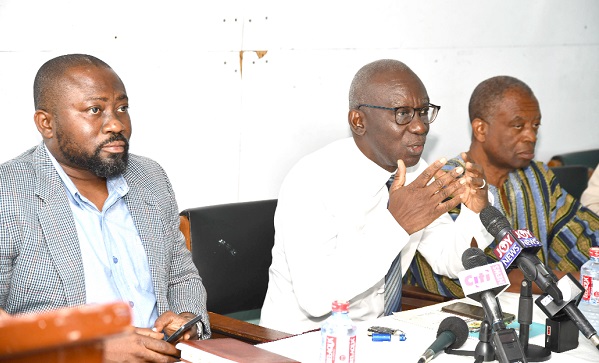
Book publishers lament financial; new curriculum thrashes old stock
The Ghana Book Publishers Association (GBPA) says its members have been hit hard by the change of the curriculum for basic schools, effective the start of the 2019/20 academic year.
It said the old stock of textbooks in warehouses from publishers alone was in excess of GH¢15 million in value, with bookshops yet to collate their stock and value.
Advertisement
It said the sudden swap to the new curriculum by the National Council for Curriculum Assessment (NaCCA) had imposed difficult financial and technical challenges on members.
The association has, therefore, called on policy makers to avail themselves for a mutually beneficial engagement on the matter.
At a news conference in Accra yesterday, the President of the association, Mr Elliot Agyare, said the change in policy — which led to a directive to schools not to buy books for the old curriculum — had affected the already fragile industry.
“For the first time, the change in curriculum means that almost all the textbooks that were being used previously are not appropriate for teaching and learning using the new curriculum,” he said.
“The situation confronting us is a direct result of the government’s change in policy. It is our view that some investigation be undertaken to find out the real cost, not only to the industry but the economy as a whole,” he said.
Lack of textbooks
He said the lack of textbooks in the classrooms was as a result of the stipulated time needed to produce quality textbooks for the new curriculum.
He noted that the NaCCA only released the modalities to guide publishers in the submission of the textbooks on July 17, 2019.
The 2019/20 academic year begins next week.
“For the submitted books to be of the best quality, the books were required to be trial-tested in the classrooms before their submission for evaluation to the NaCCA,” he explained.
He said publishers were also to submit the textbooks for evaluation by NaCCA on a ‘roll-on basis’ — which he explained to mean there was no deadline for submissions, and that publishers could submit their books for evaluation whenever they completed them.
The association urged the Ministry of Education (MoE) to give a deadline for the submission of textbooks to NaCCA.
“It is also important for the MoE to give some indication of when books will be procured into classrooms. Unlike previous submissions, publishers are for the first time developing these new curriculum textbooks at great expense without any idea of the procurement plans of the MoE,” he said.
He urged them to expedite any further changes in the modalities and guidelines for the submission of the textbooks to avoid affecting the development of textbooks.
Importance of textbooks
Commenting on news reports making the rounds that “textbooks are only a ‘back-up’ in the teaching and learning process”, he said such comments put a low premium on the importance of textbooks in the classrooms.
“It is critical, therefore, that we do not rationalise the importance of some crucial elements of the educational system because they may not be readily available at a time they should be,” he said.
He, however, commended the efforts by the MoE for shifting the structure and content of the educational system from merely passing examinations to encouraging creativity and critical thinking.




